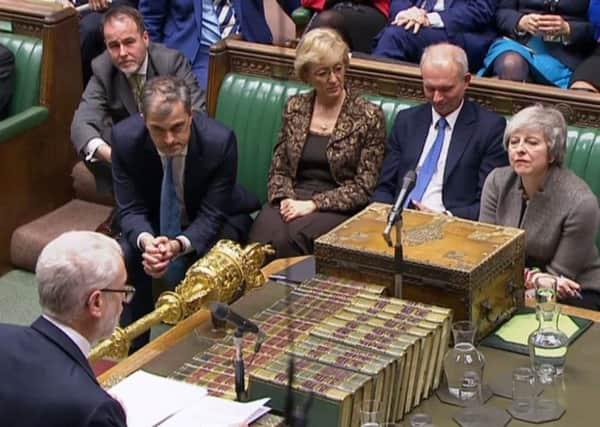Labour and Tories may have to split to avoid no-deal Brexit – Paris Gourtsoyannis


It’s just one of the many ways Brexit has proven to be a disappointment: despite rattling the UK’s constitution to its core and radically altering political norms, leaving the EU has yet to change the landscape of the party system. It was assumed that resolving the internal contradictions over Europe would result a split in one of the two main parties.
How could the Tories stay united with one flank abhorring a no-deal Brexit, and the other actively pushing for one? And how could MPs in Labour pushing for a second EU referendum reconcile with a leader who believes in delivering it, not stopping it?
Advertisement
Hide AdAdvertisement
Hide AdTrying to push a binary, popular choice through the one of the oldest representative parliamentary democracies in the world has been the root cause of the current deadlock, and the best argument for a no-deal exit from the EU.
Now it seems there is a final opportunity to salvage a Brexit deal and avoid a chaotic cliff-edge scenario. But having already rampaged through the constitution, devolution and decency in public debate, the price of an orderly Brexit will be high: it needs not one, but both the UK’s main political parties to destroy themselves.
It should already have been obvious that no one Brexit position could win unanimous support from either the Conservatives or Labour. Tory MPs were ready to hand their Prime Minister the worst defeat in parliamentary history and torch their remaining reputation as a party of sound government in the process. But Labour MPs, too, have shown how impossible it is to unite behind a single position, even with their leader furiously triangulating between different interests. It was Labour votes that killed off not just the idea of a second EU referendum, but also the best chance of avoiding a no-deal exit on 29 March by extending Article 50, through the Cooper amendment. Now those same Labour MPs in Leave-voting areas are in talks to accept one-time investment from a Conservative Government in exchange for voting to deliver Brexit, against what their colleagues say is the party and the national interest.
It’s said the 200-year-old trauma of the Corn Laws lives on among Tories, who have a terror of party splits – that’s why we had an EU referendum in the first place. An illustration of just how deep that fear runs, and how desperate the situation is, is offered by the so-called ‘Malthouse compromise’ between Brexiteer and Remainer MPs.
It has brought together polar opposites in the Conservative Party, with the most extreme Eurosceptic views, represented by Jacob Rees-Mogg and Steve Baker, joined in an unlikely partnership by Nicky Morgan, a one-time ringleader of pro-EU troublemakers. Tories enthusiastically embraced the outbreak of compromise and unity – that’s why Housing Minister Kit Malthouse could lend his name to an effort to rewrite the Government’s central policy without being sacked. It’s likely only thanks to the existence of the Malthouse group that the Government was able to salvage its deal, securing a majority for Sir Graham Brady’s amendment calling for the replacement of the backstop.
But the Malthouse compromise is an exercise in saying anything to get Tories in the same room together. It’s approach is to take each faction’s core beliefs, cut them in half and stitch them to one another – not one Frankenstein’s monster, but two: a negotiated deal that replaces the backstop with ‘alternative arrangements’ for the Irish border, and a no-deal scenario with a two-and-a-half year transition.
It speaks to just how poorly informed the UK political establishment has been throughout the Brexit process that MPs believe a third country could be allowed to automatically stay in the EU single market and customs union. With 50 days until Brexit, it is beyond credibility, and only makes sense as a Tory team-building retreat.
In Brussels and in Downing Street, they know Malthouse is a smokescreen, and Brexiteers are no more likely to vote for a final Brexit deal that doesn’t meet their demands. The Tory civil war over Europe is forever: it won’t be solved by a single vote and a couple of PowerPoint slides from a handful of MPs.
Advertisement
Hide AdAdvertisement
Hide AdOn the Labour side, Jeremy Corbyn is also learning how difficult it is to bridge divides over Europe. He has manoeuvred himself – and been manoeuvred by shadow Brexit Secretary Sir Keir Starmer – into offering what is probably the only Brexit deal that can win a majority in the Commons and the approval of Brussels, while solving the Irish border problem. It covers a deal that includes a customs union and close alignment with the single market, while remaining silent on the issue of free movement of people.
If the Prime Minister and the Labour leader worked together and brought loyal MPs with them, they could get it through parliament. But May would face a huge rebellion – possibly even bigger than the one that saw her lose by 230 votes a few weeks ago. It would also be costly for Corbyn. Even if Labour MPs weren’t whipped, many would see the offer from their leader as a green light to vote with the Government; but for staunch Remainers, their leader’s offer is already a betrayal. As polling has repeatedly shown, if voters believe Labour has enabled Brexit, the next election would could be devastating – especially in Scotland.
Part of the reason why European politicians have been so appalled by the UK’s approach to Brexit is that on the continent, they are used to cross-party cooperation, particularly on issues of huge national importance. British politics don’t work that way, and haven’t fragmented to the same degree under pressure from the recession and constitutional conflict. But to get a Brexit deal through, that will have to change. To avoid a national calamity, both main parties may have to break themselves.
